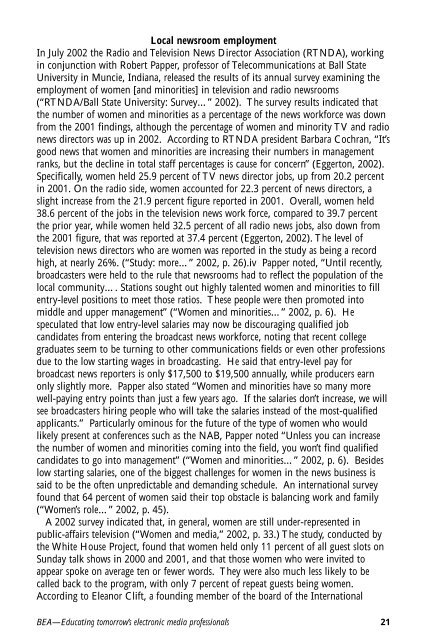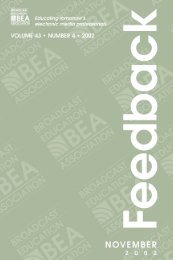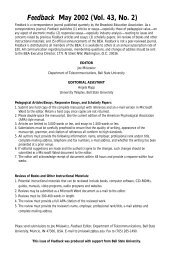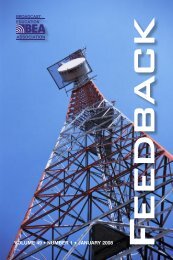Perhaps the group of women most likely to serve as presenters and chairs on sessionsat NAB is comprised of those who work in the top executive positions in broadcastingand entertainment companies. Unfortunately, according to the Annenberg studyreleased in August 2002, the “glass ceiling” continues to keep men in power posts tothe exclusion of women. Specifically, at the ten major entertainment companies(among them, Disney, Viacom, AOL/Time Warner) women accounted for just 14percent of the top executive spots and 15 percent of the board member slots in 2001.Apologists contended that recent industry consolidation has stripped some of the rungsfrom the corporate ladder, leaving women with the opportunity to run divisions butnot entire companies. However, according to Discovery President and COO JudithMcHale, the classic “pipeline” explanation does not fully account for the current levelof women at top ranks, since there are many qualified women who have worked in theindustry for more than 20 years, and “…until you have more women in leadershippositions, it will be difficult to make changes and make progress.” While one femaleexecutive in the television industry found the results of the Annenberg study to be “thesame old story,” the publication of the report “at least gets people talking about theissue” (Romano, 2002, p. 9). The Annenberg report indicated that fewer than 20percent of the board members of the largest communication companies are women,with men accounting for more than 75 percent of the top executive positions acrossfour different communication company sectors. According to Susan Ness, former FCCCommissioner and now Director of the Information and Society Section of theAnnenberg Public Policy Center, “There continues to be a dearth of women in theexecutive suites and corporate boardrooms of communications and e-commercecompanies…With few exceptions, we have not moved beyond tokenism in the numberof women in top leadership positions or serving on the boards of communicationscompanies” (cited in Tepavcevic & Slass, 2002, p. 1). Among the 23 biggest telecomand cable providers women accounted for only 12 percent of directors and 16 percentof executives. One bright spot was that within the seven commercial broadcasttelevision and cable networks, women account for 32 percent of news executives.Among presidents and CEOs of more than 120 broadcast television and cablenetworks/channels, just 16 percent are women. The Annenberg report also stated thatfour out of five heads of local cable systems are men, as are more than four out of fiveheads of local television stations. According to Ness, “Ironically, women may have agreater opportunity now than ever before to be tapped as top executives and boardmembers. They should not be chosen, however, solely to add diversity. Women areready with the expertise, the commitment, and the talent to provide shareholders andmanagement with knowledgeable and dedicated service” (Tepavcevic & Slass, 2002, p.2). Still, according to the Annenberg study, females accounted for 30 percent of theexecutives at the seven national broadcast and cable news outlets last year, comparedwith just 20 percent the year before.i In programming at the national level, 16 percentof the top executives at 120 broadcast and cable channels are women.ii There are also anumber of female GMs at cable networks, including History Channel, TNN andVH1.iii At the local broadcast TV level, in the “top 210 media markets there were 243general managers, 823 female anchors, and 450 female news executive producers whoare women. Thus the report indicated that women fare slightly better at lower levels ofcommunication companies. (Romano, 2002, p. 9).20Feedback April 2003 (Vol. 44, No. 2)
Local newsroom employmentIn July 2002 the Radio and Television News Director Association (RTNDA), workingin conjunction with Robert Papper, professor of Telecommunications at Ball StateUniversity in Muncie, Indiana, released the results of its annual survey examining theemployment of women [and minorities] in television and radio newsrooms(“RTNDA/Ball State University: Survey…” 2002). The survey results indicated thatthe number of women and minorities as a percentage of the news workforce was downfrom the 2001 findings, although the percentage of women and minority TV and radionews directors was up in 2002. According to RTNDA president Barbara Cochran, “It’sgood news that women and minorities are increasing their numbers in managementranks, but the decline in total staff percentages is cause for concern” (Eggerton, 2002).Specifically, women held 25.9 percent of TV news director jobs, up from 20.2 percentin 2001. On the radio side, women accounted for 22.3 percent of news directors, aslight increase from the 21.9 percent figure reported in 2001. Overall, women held38.6 percent of the jobs in the television news work force, compared to 39.7 percentthe prior year, while women held 32.5 percent of all radio news jobs, also down fromthe 2001 figure, that was reported at 37.4 percent (Eggerton, 2002). The level oftelevision news directors who are women was reported in the study as being a recordhigh, at nearly 26%. (“Study: more…” 2002, p. 26).iv Papper noted, “Until recently,broadcasters were held to the rule that newsrooms had to reflect the population of thelocal community…. Stations sought out highly talented women and minorities to fillentry-level positions to meet those ratios. These people were then promoted intomiddle and upper management” (“Women and minorities…” 2002, p. 6). Hespeculated that low entry-level salaries may now be discouraging qualified jobcandidates from entering the broadcast news workforce, noting that recent collegegraduates seem to be turning to other communications fields or even other professionsdue to the low starting wages in broadcasting. He said that entry-level pay forbroadcast news reporters is only $17,500 to $19,500 annually, while producers earnonly slightly more. Papper also stated “Women and minorities have so many morewell-paying entry points than just a few years ago. If the salaries don’t increase, we willsee broadcasters hiring people who will take the salaries instead of the most-qualifiedapplicants.” Particularly ominous for the future of the type of women who wouldlikely present at conferences such as the NAB, Papper noted “Unless you can increasethe number of women and minorities coming into the field, you won’t find qualifiedcandidates to go into management” (“Women and minorities…” 2002, p. 6). Besideslow starting salaries, one of the biggest challenges for women in the news business issaid to be the often unpredictable and demanding schedule. An international surveyfound that 64 percent of women said their top obstacle is balancing work and family(“Women’s role…” 2002, p. 45).A 2002 survey indicated that, in general, women are still under-represented inpublic-affairs television (“Women and media,” 2002, p. 33.) The study, conducted bythe White House Project, found that women held only 11 percent of all guest slots onSunday talk shows in 2000 and 2001, and that those women who were invited toappear spoke on average ten or fewer words. They were also much less likely to becalled back to the program, with only 7 percent of repeat guests being women.According to Eleanor Clift, a founding member of the board of the InternationalBEA—Educating tomorrow’s electronic media professionals 21
- Page 1 and 2: Educating tomorrow’selectronic me
- Page 3 and 4: CONTENTSESSAYTransitionsRalph J. Be
- Page 5 and 6: ESSAYTRANSITIONSBy Ralph J. Begleit
- Page 7 and 8: party. It was a fabulous experience
- Page 9 and 10: een accustomed to leaving my “whe
- Page 11 and 12: ADVISING:THE LITTLE SECRET HIDDEN I
- Page 13 and 14: • Total intake model—all studen
- Page 15 and 16: Response to the survey has never re
- Page 17 and 18: assessment of the Center in conclus
- Page 19 and 20: SENSE-MAKING AND THE PERSONALVIDEO
- Page 21 and 22: database. A limited implementation
- Page 23: RESEARCHTHE PARTICIPATION OF WOMENI
- Page 27 and 28: the referral source of each person
- Page 30 and 31: Discussion and ConclusionsOur analy
- Page 32 and 33: Lind, R. A., & Braun, M. J. (1996,
- Page 34 and 35: downloading services. www.schoolsuc
- Page 36 and 37: major professional selling points i
- Page 38 and 39: COURSE GRADINGElement Percent of Du
- Page 40 and 41: REVIEWHyde, Stuart (2003). Idea to
- Page 42 and 43: The primary purpose of this study i
- Page 44 and 45: detailing the number of phone numbe
- Page 46 and 47: these newscasts that “primary”
- Page 48 and 49: As Table 1.3 shows, comparing only
- Page 50 and 51: RESEARCHACCURACY IN LOCAL TELEVISIO
- Page 52 and 53: anked 26 to 50. After eliminating n
- Page 54 and 55: 2. How often do news sources compla
- Page 56 and 57: Participants were asked which one m
- Page 58 and 59: These stations still archive script
- Page 60 and 61: TABLE 12002 BEA News Division stude
- Page 62 and 63: Eiles at WCHS-TV, Portland, Maine.
- Page 64 and 65: ESSAYWHAT’S OLD IS NEW AGAIN:THE
- Page 66 and 67: are. If the news agency editor or r
- Page 68 and 69: said Sagan, just as broadcast chann
- Page 70 and 71: “We’re perfectly positioned to
- Page 72 and 73: John Miller, News Director of KTVT-
- Page 74 and 75:
CLASSROOMGUEST SPEAKERS IN BROADCAS
- Page 76 and 77:
students just starting out, their m
- Page 78 and 79:
professionals, often with varied jo
- Page 80 and 81:
District NewsTo the members of Dist
- Page 82 and 83:
several held on college campuses. I
- Page 84 and 85:
2ND PLACE: Jillian Oppegard, Colora
- Page 86 and 87:
Faculty News CompetitionC.A. Tuggle
- Page 88 and 89:
AWARD OF EXCELLENCE: Kevin Hager, W
- Page 90 and 91:
BEA PRESIDENT’S MESSAGEGOALS AND
- Page 92:
THANK YOU to the following individu
















